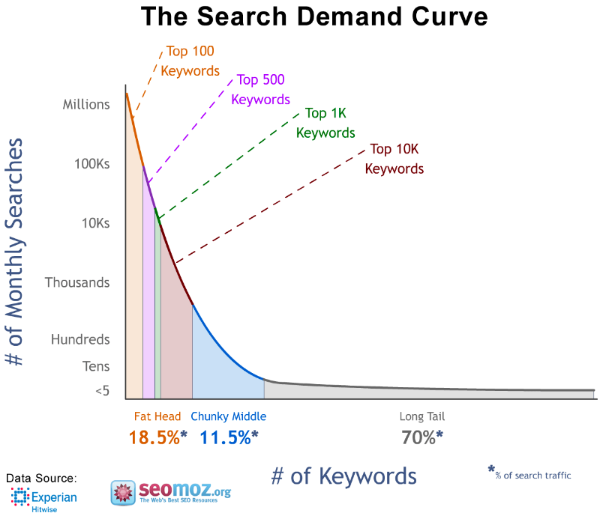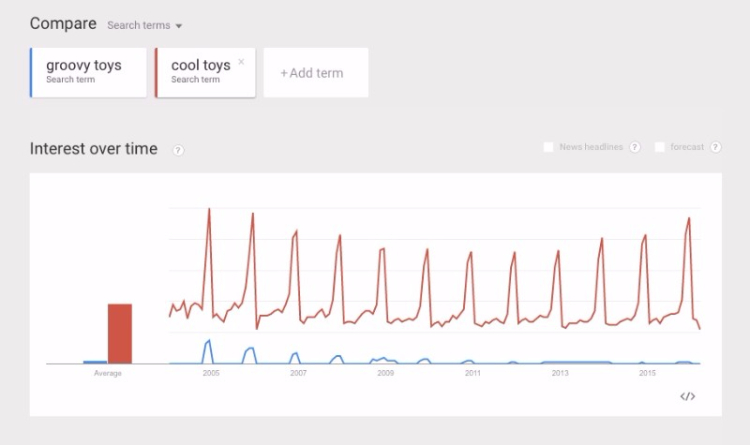Sticks and stones may break my bones, but words will never hurt me.
Remember that one from childhood? Useful anytime someone had the audacity to toss verbal ninja stars at us…but turns out it was false! Words most definitely can hurt you.
Using certain words could be having a negative impact on your online performance. To paraphrase Napoleon from Animal Farm:
“All words are created equal, but some are more equal than others.”
Deciding on which words to use – and which to actively NOT use – can be the difference between ranking well in the search engines, and languishing in obscurity (using keywords for SEO). Between a successful pay-per-click (PPC) campaign, and throwing your money away (using keywords for advertising). Words, words, words. If the pen is truly mightier than the sword, we must carefully choose our weapons.
And with 12 billion monthly searches in the United States alone, there’s a lot of words out there for the plucking. Grab yours.
Indexing
Question: how does anyone “find” a website or specific page on the internet? This may terrify arachnophobes…the answer is spiders. No, not the hairy, eight-legged variety, but rather the tiny bits of code and programming that are constantly crawling the web (pardon the pun). Searching out pages both new and old to see what they’re all about and what may have changed since their last visit. They drag this digital data back to their search engine lair in a process known as indexing. It tells their wranglers – Google, Bing, Yahoo, or whomever – what your website is and how it could help someone looking for information on…whatever your site is about.
So, the whole shebang starts with words. Keywords. The words on your page. Their relevancy to someone’s search query. It gets a lot more complicated – including “points” for page speed, age, backlinks, mobile responsiveness, and a plethora of other criteria – but words are the jumping off point. Keywords aren’t the only thing going on under the hood, but contrary to popular opinion, they definitely still matter.
If you want to get noticed – for whatever reason – you need the “right” words.
The 30-Second Keyword Research Review
But what are the right words? Come up with a list of them that you’d like to target, check them out on a keyword research tool, and examine the average monthly searches, competition (high-medium-low), and suggested bid (the average you’ll pay for a click on your PPC campaign).
The higher the bid and competition, the easier to monetize and convert (at least in theory). Remember that some words and phrases don’t lend themselves to conversion (i.e. making the sale or getting the contact details). Someone searching “what is [blank]?”, for example, is a beginner on a fact-finding mission, and not someone looking to purchase or make a commitment.
The tools are imperfect though. Better than straight guesswork, but not to be considered the gospel, either. There are some shortcomings and dirty little secrets to keep in mind.
Free Keyword Tools:
- Google Keyword Planner
- Bing Keyword Research (Bing commands roughly 20% of search engine queries)
- WordStream
- Keyword Tool
- Ubersuggest
- InstaKeywords
Paid Options:
What NOT to Do: Keyword Stuffing
Once upon a time, in a cyberspace very different from the one we have today, virtually anyone could rank – and rank well – by simply saturating their page with a given keyword or phrase. It was easy. They would write a crappy blog post and toss the keywords in as many times as possible, post it with a title that also included the exact keywords, and sit back with a villainous smirk on their face. Some especially unscrupulous individuals would even add long lists of keywords somewhere on the page, but the text colour matched the background, rendering them invisible to all but the indexing spiders. The traffic would arrive. Oh yes, it would arrive.
How about this? “Looking for affordable hair products? Look no further than our affordable hair product emporium, your one-stop shop for all affordable hair products. Unlike other affordable hair product retailers, our affordable hair product offerings are not generic, no-name brands. Our affordable hair products are the famous brands that you know and love. When you think affordable hair product, think of us: Affordable Hair Product Superstore.”
Bad. Just bad. Horrible. Cringe-worthy. That said, at the time, it was a somewhat successful strategy. But no more.
Keyword stuffing will get you penalized by Google and Bing, sooner or later. You’ll be banished to page 67 of the SERPs (search engine results page), or de-indexed altogether. So don’t do it. It’s tempting. You may even see some initial positive return. But much like eating an entire tub of raw cookie dough, it’s a bad idea. You’ll pay for it later.
Instead, be judicious. You can – and should – include keywords in your posts, but appropriately and selectively:
- Put them in your title, a subheading or two, meta description (the blurb that appears on SERPs and social media shares), and of course, the body of your text (most experts suggest including it at least once in the first 150-200 words).
- Use keywords only enough to assist those clever little spiders determine what your page is all about.
- They should only account for roughly 1-3% of your total word count. Any more than that, and you’re stuffing. The text sounds unnatural. Your readers will bounce faster than a helium-filled basketball.
Be real. Use your keywords or phrase as would be expected. If you’re writing about vacation rentals in Dubai, you would expect the phrase “vacation rentals in Dubai” (or some variation) to appear a few times, no? So use that. Brainstorm a list of several ways people may look for it: short-term property rental in Dubai, Dubai vacation rentals, short-stay apartments in Dubai, Dubai vacation suites, and so on. Variety is the spice of life…and good websites. Don’t just repeat the exact same keywords or phrase everywhere. Mix it up. Google likes that.
Google looks at everything in context. It looks for and includes synonyms and variations. It examines the page in its entirety to get an accurate understanding. And it’s very good at determining the searcher’s intention as well: what do they want, and does your page provide it?
Your keywords are PART of that equation. But no stuffing. Stuff and your words can hurt you in your quest to be visible on the web. Aim for authentic usage. Capisce?
The Dark Side of Specificity
We hear all the time about the importance of specificity in our word choice. From our parents, teachers, colleagues, and superiors. They say things like “be precise” and “never use a vague word when a specific one exists”…you’re not just tired, you’re exhausted. As an English teacher, I wholeheartedly agree.
Except when I don’t. Sometimes, you want to be a little broad (is anyone else picturing a short woman from the 1940s?) when it comes to your word selection. Sometimes, specificity can be bad, and take you to the dark side.
Depending on the type of attention you’re trying to get online (SEO vs advertising), a specific keyword or phrase may actually have the opposite effect. It may bury you under hundreds – thousands – of others. It may put you up against huge corporations and established brands. It may bring you attention…but the wrong kind.
Let’s pretend you sell orthopaedic shoes. You could target “foot pain” (as that’s definitely something your kickass shoes could alleviate), but that query could also include people with severe athlete’s foot, for example. “Foot pain” is a little too specific in this case, as would be twisted ankle, bunions, and hammertoes. Your shoes may be the perfect solution for all of those things, but people searching for them online may be looking for doctors, causes, symptoms, home remedies, or even definitions…but not necessarily shoes as a solution. A better – albeit more generic – keyword phrase in this scenario would simply be “orthopaedic shoes”. Anyone typing that exact phrase into Google or Bing is interested in what you’re selling. Target “foot pain” and you may inadvertently compete with Gold Bond (a massive international brand) foot powder. As a small and local business, you ain’t winning that battle. Your words can hurt you.
When it comes to advertising, PPC campaigns, selling, and converting, you’re much better off targeting just a few, somewhat generic words and phrases. Going after too many dilutes your incoming traffic, which means…your words will hurt you. You’ll be paying for clicks from people who don’t want what you’re offering. Your best bet in this scenario would be the broader search term (and its variations) “orthopaedic shoes [your town or city]”.
Why? Because 78% of all mobile searches with a location qualifier lead to a purchase within 24 hours. Read that again. Awesome, right? When someone searches for “orthopaedic shoes Toronto” while on the go, they’re looking to buy. And soon. So let them find you. Even better? Categorical searches – when they don’t have a particular business in mind – are the second biggest chunk of that traffic. You may now do your happy dance.
Consider: instead of chasing after wedding cakes, wedding menu, wedding gowns, tuxedos, tent and chair rental, wedding flowers, marriage license, wedding ideas, wedding photographers, exotic locations, and wedding ceremony, you simply target “wedding planner”…because that’s what you do. Yes, you’re involved in all those things, and yes, those are the specifics of your service.
However, cast your word net too wide, and you may end up competing for traffic against Moore’s Tuxedos, and a national gown designer, and a government website. They are not in direct competition with you and your business, so why compete for word traffic? Beyond that, people typing any of those examples into a search engine may be looking for DIY ideas, digital window shopping, or simply daydreaming. They may not need you, whereas someone entering “wedding planner [your town or city]” is most likely ready to pull that particular trigger. Ka-ching!
Be Broad…But Not Too Broad
And not all the time. Some industries and professions beg for specificity. And if your main goal is SEO, you’ll want to zero in a bit more. You’re not just an insurance broker, you’re a CAR insurance broker. You’re not just a mechanic, you’re an imported sports car mechanic, or a Mercedes mechanic.
This is a focus on words and phrases for SEO purposes, most likely connected to your content marketing efforts. Broad may be beautiful, but long-tail rules this roost.
Head Keywords
Targeting and optimizing for a broad and localized keyword phrase like “accountant Seattle” is ideal to get clients as a chartered accountant in Seattle. That’s a head keyword (usually 1-2 words), and it accounts for roughly 30% of all search queries. That’s nothing to sneeze at. Do it properly, and it can bring in the consumer bucks.
Long Tail Keywords
At the other end of the spectrum are long tail keywords. These represent the other 70% of all search queries. They’re not flashy. They typically don’t have huge search volume, but the potential to rank is much higher because fewer people are going after them. And that’s a very good thing for your SEO strategy (which translates to more leads and sales over time). You could go after the heavy hitters, competing with dozens (or hundreds, or thousands) of others for the head keywords, fighting and clawing to try and appear on the first page of search results. Or you could target the 15-20 people looking for a hyper-focussed long tail phrase and basically guarantee that you’ll be at or near the top. Tough call, right?
Think about how we use Google or Bing these days. We often write in questions like “where can I find craft beer in phoenix?”, or strings of 3-5 words like “irish pub phoenix craft beer”. Those are all long tail queries. The number of people searching for them is much lower than just “beer” or even “craft beer”, but the user is more targeted to what we have on tap (no pun intended) as an Irish pub owner in Arizona. If we target those long tail but low volume queries, when someone does go looking for them, it’s hyper-focussed to their needs.
More targeted traffic to our website leads to a higher conversion rate. People looking for “irish pub phoenix craft beer” will likely be sitting at our bar within a few hours, singing “Danny Boy” and enjoying a pint of Elephant Monsoon Peanut Butter & Grape Porter. Does it generate thousands or even hundreds of queries each month? Nope. But it does identify and target what people are really looking for, when they want it, and puts us on their radar. Pull them in, connect, and convert.
Too broad or generic in your SEO efforts, and your words will hurt you, either directly – you’re not providing what users are searching for – or indirectly – putting you in competition with big brands in some twisted David and Goliath showdown…except this time, David gets his ass handed to him. Say it with me – your words can hurt you.
The Popularity Game
Remember when you were growing up and adults told you that popularity didn’t matter in the “real” world. Yeah, they lied. Popularity is important…when it comes to online word choice.
This applies to both categories: words for SEO, and words for PPC and digital advertising. You want to select the words that the popular kids are using. The words sitting at the cool table in the cafeteria. Luckily, you can identify them easily (and no, not because of their designer duds).
Enter Google Trends.
“Google Trends gives you a glimpse into the topics the world is searching for.”
Useful? Useful. You can search for keywords and phrases in the Explore function, selecting time periods (from 2004 until the present), geographic location (worldwide, or individual countries), topic categories, and either web, image, news, or YouTube search. How’s that for precise? You can even compare up to 5 terms at once.
Word Choice
It shows how often a particular search-term is entered relative to total search-volume (scored out of 100) across various regions and time. Use it to select the most popular words to describe you, your business, your brand, and your product.
For a simplified example, let’s assume you sell fun and innovative toys. You want to express their popularity and innovation in your marketing, so you’re debating between targeting “groovy toys” and “cool toys”. Both have a nice ring to them.
A quick comparison on Trends leaves no room for debate: cool toys is consistently more “popular” with online search queries. See for yourself.
“Groovy” toys is essentially a zero these days, while “cool” toys is a strong 22 even at its lowest. And those huge and regular spikes? Place your cursor over them, and you’ll see that happens every December (tech-savvy parents desperate for a gift idea).
Trends can be a godsend for keyword research. Identify the words that will bring in traffic, and words that will hurt you.
Optimization
You can also use Trends to periodically check your website or social media profile for optimization. What words have you targeted? Are they still “it”?
Copywriters, for example, frequently describe themselves as word ninjas, word wranglers, or wordsmiths. Are these all created equal? Nope. In January 2004, wordsmith had a relative score of 100, while the other two had zeros. By January 2016, wordsmith had dropped to 21, word ninja was a meager 8, and word wrangler a minuscule 1. Wordsmith has been trending down for 12 straight years, and the other two are stagnant. Ditch them. Your best choice? Writer. Just writer.
If you’re a freelancer (marketer, efficiency expert, or whatever), you’re much better off avoiding the word “freelancer” in your SEO and PPC campaigns. It’s been steadily trending down since 2004. Go with “consultant” instead…it’s a more popular word, with over 3x the relative search volume.
In other words? Freelancer bad (hurt). Consultant good (no hurt).
Idea Generation
Trends is also a great resource to come up with ideas for your content marketing. It’s not just about word popularity. The “Trending Searches” and “Trending on YouTube” features provide a handy list of the top queries for a given day in a given location. In the United States, for example, John Kasich is trending for the morning of March 4.
How does this help you? Newsjacking. Riding the coattails of a popular or breaking topic to shine a spotlight on your own content and brand.
You have to be careful and respectful, though. Many brands have committed serious faux pas in this arena as often as they’ve succeeded. The trick is to find an APPROPRIATE way to tie the breaking or trending topic to your message…and that’s not always possible. Don’t force it. Don’t make the same mistake that DiGiorno Pizza made when they tried to newsjack the #WhyIStayed campaign (dealing with domestic abuse) by tweeting the answer “You had pizza”. Yikes!
A good example? If you have a cleaning company, and you notice that “Ghostbusters” is trending online (as it did March 3 because of the new theatrical trailer), you might be able to newsjack that topic by offering your services the next time someone gets “slimed” at home.
These popular words and phrases – when there’s an appropriate connection to be made – can be very good to you.
Words Have Power
The how and the why of search engine ranking can be complicated and mind-boggling (and more than a little cloak & dagger). The good news? You don’t have to understand it perfectly to help your site out.
You just need to know when to zero in (PPC campaigns), and when to open it up (SEO purposes). Your keyword strategy may have changed for 2016, but you still need one. It’s one piece of a thousand-piece puzzle.
With all due respect to nursery rhymes, words can hurt you, so choose wisely. Nursery rhymes, it would seem, are not infallible (maybe London Bridge is NOT falling down, and all the king’s men COULD put Humpty together again).
How much time and effort do you spend on your online word choice? What sort of return have you seen from it? Leave your thoughts in the comments below.








